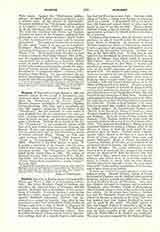

Nonnus, of Panopolis in Upper Egypt (c. 400), the reputed author of two poems in hexameters; one, dionusiaka, about the mysteries of Bacchus, and the other the “Paraphrase of the Fourth Gospel”. Draseke proposes Apollinaris of Laodicea (Theolog. Litteraturzeitung, 1891, 332), and a fourteenth-century MS. suggests Ammonius as the author of the “Paraphrase”, but the similarity of style makes it very probable that the two poems have the same author. Nonnus would then seem to have been a pagan when he wrote the first, and afterwards to have become a Christian. Nothing else is known of his life. The “Paraphrase” is not completely extant; 3750 lines of it, now divided into twenty-one chapters, are known. It has some importance as evidence of the text its author used, and has been studied as a source of textual criticism (Blass, “Evang. sec. Ioh. cum variae lectionis delectu”, Leipzig, 1902; Janssen in “Texte u. Untersuchungen”, XXIII, 4, Leipzig, 1903). Otherwise it has little interest or merit. It is merely a repetition of the Gospel, verse by verse, inflated with fantastic epithets and the addition of imaginary details. The “Paraphrase” was first published by the Aldine Press in 1501. The edition of Heinsius (Leyden, 1627) is reprinted in P.G., XLIII, 749-1228. The best modern edition is by Scheindler: “Nonni Panopolitani paraphrasis s. evang. Ioannei” (Leipzig, 1881).
ADRIAN FORTESCUE

